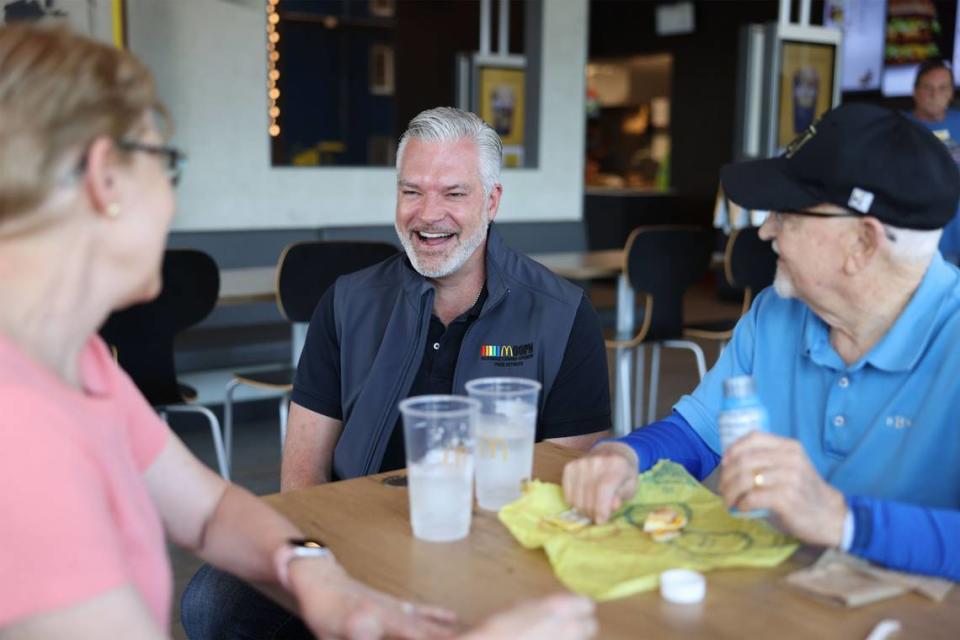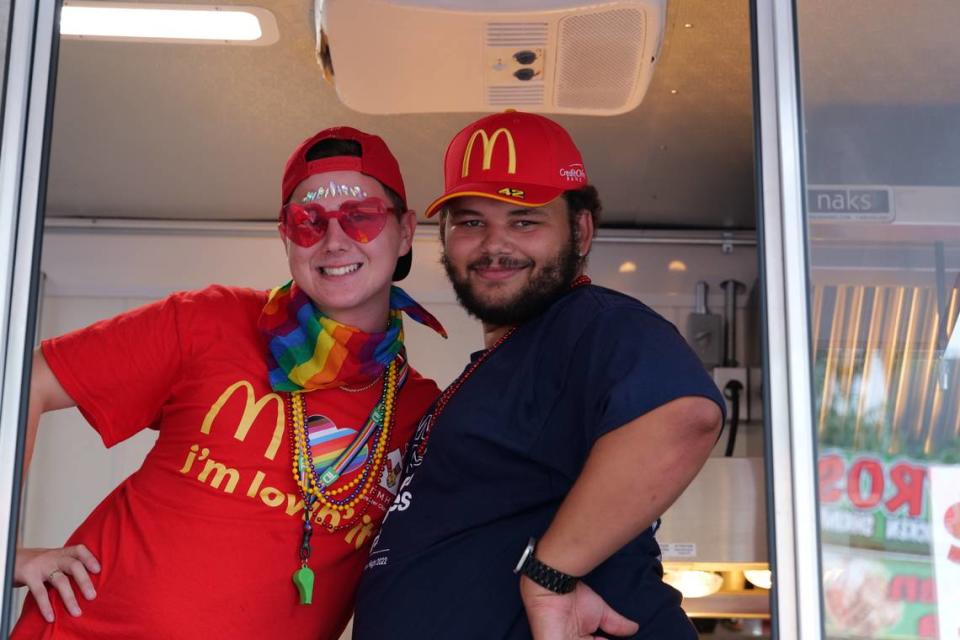McDonald’s franchise owner paved way for others. Now he’s giving back at Charlotte Pride.
Jason Saylor has experienced two very difficult moments in his life. The first was telling his parents he is gay; the second was telling his boss he wanted to become a franchisee at McDonald’s.
The fast food chain played a large role in his coming-out experience, Saylor said. After 35 years at the company, he supports his own community like his McDonald’s co-workers supported him, through partnerships with Charlotte Pride, a yearly event celebrating the LGBTQ community, which Saylor attends as a brand sponsor. The festival and parade take place Saturday and Sunday.
Today, Saylor, 51, owns eight McDonald’s restaurants in the Charlotte metro area.
His first job, in the 1980s, was at McDonald’s, he said, where he met an openly gay person for the first time. The support from his co-workers helped him accept his own identity after growing up in a small, traditional town, he said.
Throughout his career, he helped McDonald’s support its LGBTQ staff, leading the first national symposium for gay employees.
Saylor said McDonald’s has been able to support the LGBTQ community, while avoiding the backlash that affected Bud Light and Target when they launched Pride month marketing campaigns, by leading with action and not marketing.
“They built a loyalty on me and the actions they took,” he said.
‘McDonald’s played a big part in my coming out’
Saylor’s family came from humble Appalachia beginnings, he said. He went to school in Fort Wayne, Indiana, in a grade of 60 people, and the town was equally as quaint.
“It was not easy in a small town like that to be gay,” Saylor said. “So I certainly knew I was different, but I would never have shared that with anybody at that time. I was horrified.”
The AIDS epidemic in the 1980s played a large part in his fear, he said. He was in high school when it first broke out, and thought that if he acknowledged that he was gay he would die of the disease, which disproportionately affected gay and bi-sexual men at the time.
Saylor started working at McDonald’s when he was 17. He instantly connected with another employee who was gay, he said.
Years later, when Saylor was 24, he shared his identity with his McDonald’s manager before anyone else in his family. His manager encouraged him to come out to his two sisters, but he decided he would never tell his parents unless they asked him.
Saylor’s father was an Evangelical Pentecostal preacher on the weekends. Saylor said he believed that if his father found out about his identity that he would have to go into hiding.
“I had heard my father preach Hellfire sermons on more than one occasion about how he would kill his son before he would have a gay son,” Saylor said.
However, once his parents learned about his identity from his sister, they still invited him to Christmas at home, where his father met him with open arms.
“When I walked in the house, he essentially said, ‘you’re my son, I love you and I will always love you,” Saylor said.
Paying debts
Saylor left his senior year at Indiana University-Bloomington a few credits short of graduating, due to nearly $30,000 in debt that had mounted over the years. He said he would go around campus signing up for student credit cards, using them to pay his way through school.
As a vocal performance major, his financial situation forced him to put his music career on hold. Instead, he returned to McDonald’s as a store manager in Indianapolis.
He worked his way up to general manager, making $18,000 annually, but was still not earning enough to pay his debt.
After receiving a competing job offer with a $10,000 raise, Saylor was prepared to quit his job at McDonald’s.
Instead of letting him quit, the Director of Operations at McDonald’s Operating Company, which operates company-owned locations, offered Saylor a deal: If he stayed at McDonald’s, the company would pay off his credit card debt.
Moving up the ranks
The company paid off Saylor’s debt over five years. And although he didn’t get a raise, he rose through the ranks of McDonald’s. He became an area supervisor, staff trainer and even a professor — at McDonald’s training facility, Hamburger University.
From there, he moved to Pittsburgh, then to Raleigh, before having a conversation with his superior about becoming a franchisee.
This conversation was so difficult, something he said was comparable to coming out to his parents, because there was a stigma attached to those at McDonald’s who wanted to leave the company side and work semi-independently as a franchisee.
This idea has changed since then, Saylor said.
McDonald’s locations are 95% franchisee-owned; the rest are owned by McDonald’s Operating Company. This business model allows the chain to make more money by leasing locations to franchisees. The model is also profitable because the company keeps 82% of the revenue from its franchised locations, according to the Wall Street Survivor.
‘We’re locally owned and we’re gay operated’
Saylor stays close to his eight sites so he can check in on each store.
“It’s a pretty cool thing to be a McDonald’s owner/operator and also say that we’re locally owned and we’re gay operated,” Saylor said.
When he started his franchising business, Saylor tapped his first general manager at McDonald’s, Ron Hahn, the one he worked with when he was 17. They had kept in touch over the last 30 years, and Hahn came out of his McDonald’s retirement to be Saylor’s Director of Operations.
Saylor enjoys owning his own franchise business, he said. It allows him to hire his own staff, for which he has hired 460 people, and control how his stores interact with his community.
He is heavily involved with Charlotte’s Pride celebration. His involvement is a way of returning the favor done for him all those years ago, when his boss paid his debt.
Charlotte Pride
Saylor decided to bring a McDonald’s booth to Charlotte Pride eight years ago, said Denise Cubbedge, the CEO of the Ronald McDonald House in the greater Charlotte area. The Ronald McDonald House is a charity network with locations across the country, partnering with McDonald’s, that provides housing for families with children in the hospital.
This year, the McDonald’s booth at Pride will have a food truck serving fries, nuggets and sweet tea, Saylor said. He donated the food, and 100% of Saylor’s proceeds from Pride will be donated to the Ronald McDonald House.
Saylor donates supplies and food for the event, as well as his staff who serve as volunteers along with Ronald McDonald House volunteers, Cubbedge said.
The Charlotte house has served more than 2,400 families this year, and expects to serve more than 5,000 by year-end. This includes both families staying in the 28-room house on East Morehead Street and the Family Room program, which is at the Hemby Children’s Hospital, helping families stay at the hospital with their children.
The Ronald McDonald House serves everyone, Cubbedge said.
“Regardless of what your background, or interests, or anything is, our goal is to take care of the family — the whole family,” she said. “It’s a great neutralizer.”
Local McDonald’s owners and operators are responsible for most of the brand’s involvement in the LGBTQ community, Saylor said.
The employees and franchisees approached the company, wanting it to market to the LGBTQ community in addition to its internal work with its own LGBTQ staff.
Saylor said he believes the company stepped up to that expectation, and that is where much of his brand loyalty comes from.
Employees coming out and stepping up
After Saylor came out within the company, McDonald’s asked him to meet with the U.S. company president at the time, Don Thomson, in 2006. The company wanted staff members who identified as gay to discuss ways for the company to support LGBTQ staff. At the time, only seven employees, including Saylor, were openly gay.
“We all looked at each other going, ‘this is either the best thing we’re ever going to do, or we’re all about to end our careers permanently’,” Saylor said.
The group consisted of employees from every sector of the company, from officers to IT technicians.
This started a gradual corporate education on diversity and inclusion, led by diversity educators who specialized in the LBGTQ community and LGBTQ employees.
Saylor went on to serve as the chair for the first McDonald’s national symposium for openly gay employees in 2009. He said of the 120 people who attended, only 13 identified as gay, the rest identified as allies.
“Because they were all still afraid,” he said.
Now, Saylor said, there are thousands of openly gay employees across the company and multiple Pride chapters.
“(McDonald’s) had a massive group of employees working for them, who are LGBTQ who didn’t feel supported,” Saylor said. “And to see that flip, I think it changes internally how you feel about the brand.”



